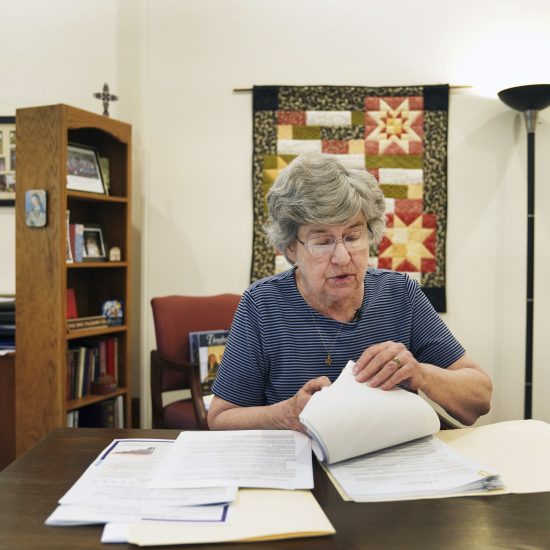“Glory to God in the highest, and on earth peace, good will toward men.” These words the angels proclaimed at Jesus’ birth (Luke 2:14) still resound each Christmas in songs, in sermons and on greeting cards.
But the warm feelings of Christmas and the anticipation of a new year quickly are overshadowed by conflict over needs and desires — the clash of cultures.

First Baptist Church in Lee’s Summit, Mo., often hosts cookouts for its community. The congregation serves the city in a variety of ways. (FBC, Lee’s Summit, photo)
|
Each Christmas is a renewed call to embrace God’s kingdom and to seek to do God’s will “on earth as it is in heaven” (Matthew 6:10). But what does that mean?
“Kingdom culture” has become a buzzword over the past few years, now representing everything from church names to ministries to discipleship conferences to clothing brands. The term is applied to sermon series, book titles and hot-button issues.
For Harry Rowland, Cooperative Baptist Fellowship’s director of missional congregations, kingdom culture comes to a community when Christians are living out Matthew 25 — meeting needs and putting others first.
Mark Clifton sees kingdom culture as obedience to join God where he is already at work. The national legacy strategy leader for the Southern Baptist Convention’s North American Mission Board focuses on living generously and obediently through all life’s aspects.
Believers must recognize that “God’s at work all around…even in my life, my work, my school” and ask themselves: “How can I fit into that?” Clifton emphasized.
And Christians need to be the most generous members of their communities “with our money, our time, and with our love and compassion,” he added.
For kingdom culture to thrive, Christians must look beyond today’s “culture wars,” both leaders said.
Culture wars center on claiming personal or group rights and on having the “correct” understanding.
“For some, ‘culture’ has a military connection…rather than as living among one another…as sacrificial living,” Rowland said. “Jesus lived without claiming his rights…. We live backwards and try to claim our rights without sacrifice.”
Both leaders pointed out that people must be reached in their “heart language” first, and that “heart language” is more than a linguistic pattern.
The most common understanding is language itself — “the language they pray in,” Rowland explained. But “heart language” also includes expression of attitudes and understanding.
“Heart language is also what speaks to the heart more than what’s seen or heard,” he said.
Rowland pointed to music and art as expressions of the heart in most cultures. People can “allow the Spirit of God to work through expression,” he said.
The third form of heart language, he believes, is sensitivity to others. “Jesus was sensitive to people around him. He spoke to the need and met people at the point of need,” Rowland said.
He noted the woman Jesus met at the well. “Jesus placed his message next to her heart,” Rowland explained. “The Christian message speaks to the heart…. We often don’t spend enough time listening to the heart…or to talk…and to share a word of love.”
To reach the heart, believers must be willing to reach out to people in “a way that resonates in the way [in which others] experience life…in their context,” Clifton said. Believers must want to remove every cultural, language and ethnic barrier.
Both leaders pointed out that differences exist on several levels, even among people of the same culture. “Even my Millennial children speak…differently than my Builder father,” Clifton said.
Christians should concentrate on the “scattered church,” rather than the “gathered church,” the NAMB worker stressed. While he believes the local church should be “multigenerational and reflect its community,” Christians shouldn’t “be hung up” on what the “gathered church” — meeting together as a congregation — looks like.
Instead, members must focus on being the “scattered church” — living life together, socializing and being in community together.
“We need to be intentional about living with people who are different than we are…. We need to spend time together to listen to each other, enjoying each other, to learn from each other,” Clifton said.
Yet, believers still must take cultural differences into account, recognizing the differences but “not expecting them to become like us,” he added.
John 17 shows Jesus’ desire for Christians through the ages to reflect the oneness of the Trinity. That doesn’t mean local bodies of believers must strive to become multicultural, Clifton said. He compared the church to marriage. Though a husband and wife are united, they still maintain their separate identities.
Rowland sees “culture making” as an effective way to bring Christians together. Jesus concentrated on the fruits of the Spirit as the basis of the culture he brought to earth.
“Jesus tried to create a culture of love, joy, peace — of coming alongside of people,” Rowland said. “For example, if we believe Christ called us to peace…then we need to ask” How do we create a peaceful culture in our community?”
The Baptist Missionary Society of Great Britain, the world’s oldest mission-sending agency, is taking another approach, Rowland explained. It is leading British churches to use the term “multiethnic” as the expression of multiple cultures and the term “culture” as a Christian expression.
Church members are being led to explore how to develop a common culture — how to worship together, to serve together — without giving up ethnicity. The churches are exploring how to “make” a Christian culture that embraces multiethnic differences.
Christian communities must ask themselves: “How do we capture that and celebrate that, and how do we make that alive in the church?” Rowland explained.
“We must journey together to allow God to get us there…. As the body of Christ, we work together to express ethnicity.”






